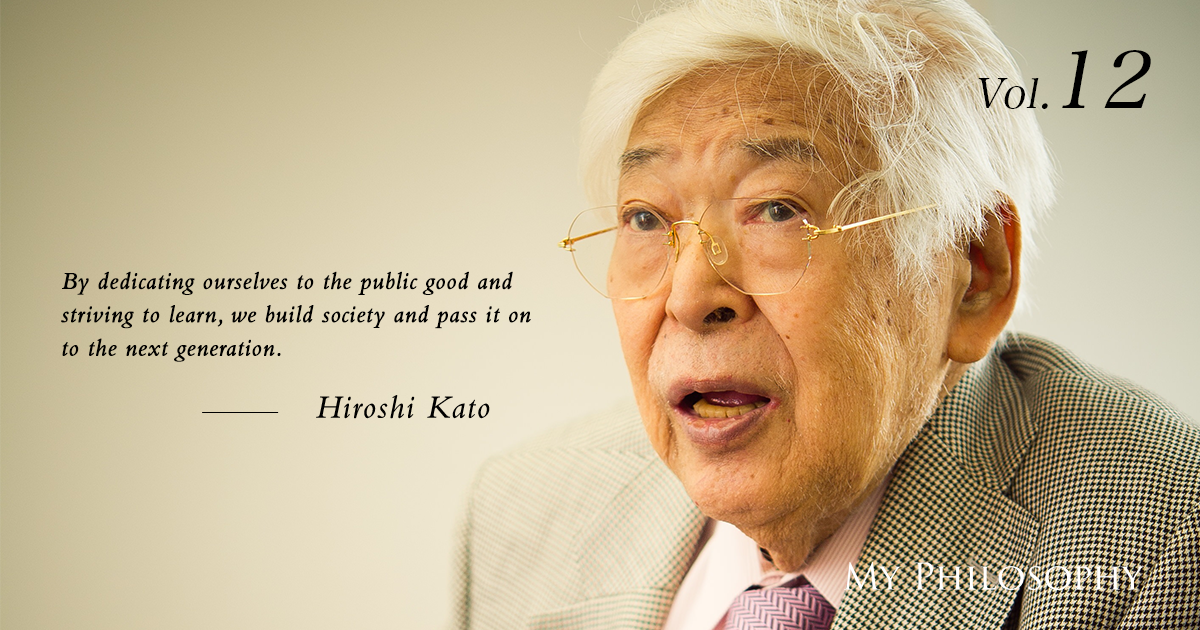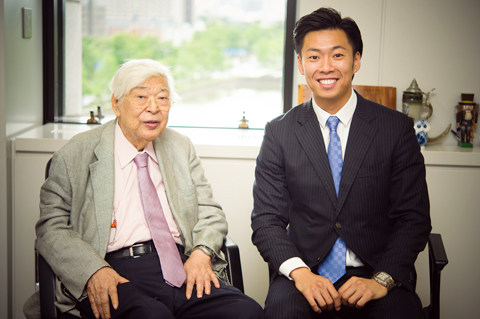
Mr. Hiroshi Kato has played a central role, as an economist, in the theory and practice of Japan's economic policies. We had the opportunity to speak with him about what is currently needed in Japan and what actions we should take as leaders in administrative reform.
Profile
Vol.12 Hiroshi Kato
Economist
After serving as a professor in the Department of Economics at Keio University, he established the Faculty of Policy Management at Keio University in 1990 and became its first dean. After stepping down, he held positions such as Emeritus Professor at Keio University, President of Chiba University of Commerce, and Honorary President of the same university. During his tenure as a professor at Keio University, his students included notable figures such as Junichiro Koizumi, Ichiro Ozawa, and Heizo Takenaka. Outside the university, he led as the President of the Japan Economic Policy Association and the Japan Association for Planning Administration, guiding economic policy in Japan. He also contributed as a key advisor on postal privatization and structural reforms.
※The titles and positions are as of the time of the interview in June 2012.
Mr. Hiroshi Kato passed away on January 30, 2013, at the age of 86. We are deeply grateful to have had the opportunity to conduct this interview while he was still in good health. We sincerely pray for his eternal peace. DK Sugiyama, Editor-in-Chief, “My Philosophy”
Without Effort and Learning, an Equal Society cannot be Born.
One of the principles I hold dear is the importance of “striving to learn,” a crucial teaching of Yukichi Fukuzawa. Among his teachings, the most significant is that “without education, one cannot lead an equal life.” In “An Encouragement of Learning (Gakumon no susume),” it is stated, “Those who diligently pursue knowledge become noble and rich,while those who are uneducated become base and poor.” This implies that there are inherent differences in people’s abilities and perspectives, which in turn create disparities in life; thus, life is not inherently equal. One must make an effort to achieve equality, meaning that without education, an equal life is unattainable.

Furthermore, “An Encouragement of Learning” mentions, “Heaven does not create one person above or below another.” This is not merely a wish for equality among all. It emphasizes the necessity of effort and learning to achieve equality, a message Yukichi Fukuzawa repeatedly conveyed.
The Concept of Understanding the Public Good Shapes Japanese Society.
Another one of my principles is “for the public good.” As an economist, I do not believe that the essence of economics is merely making money. Of course, it is better to earn more money, and I do not deny that. However, what is truly important is not to hoard wealth for oneself but to consider how much of it can be used for the public good.
For instance, economically prosperous companies should use the profits they have earned from their businesses to contribute to society. It is heartening to see that among the entrepreneurs currently at the forefront, there are those who have recognized this and are actively engaging in such activities. Perhaps there comes a turning point in every person’s life, no matter how much they have earned, when they realize, “I cannot live just for myself, I must give back to society.”
Driven by Social Passion towards the Path of an Economist.

Throughout my career as an economist, I have held prestigious positions such as the President of the Japan Economic Policy Association, the President of the Japan Public Choice Society, and the Japan Association for Planning Administration. I have been deeply involved in Japan’s fiscal and administrative reforms, including the privatization of the National Railways and the introduction of a tax system centered on indirect taxes and correcting the direct-to-indirect tax ratio. My choice to pursue a career in economics was not motivated by money.
In my youth, during the post-war period when Japan was still in disarray, I pondered as a member of society, “How can we rebuild this society?” The answer I eventually arrived at was economics.
The British economist Arthur C. Pigou once said, “Carlyle said that philosophy begins in wonder. Economics is a social passion generated by wandering through the foul-smelling streets.” It was precisely this “social passion,” the desire not just to enrich myself but to enrich Japan and create a better society, that guided me toward becoming an economist.
As long as there are disparities in society, globalization is not possible.
Nowadays, globalization is often discussed, but fundamentally, I believe the first step towards true globalization is eliminating disparities. As long as there are barriers between people, globalization cannot progress. What is needed to remove these barriers is education. And in education, it is crucial to persevere and continue steadily. Even looking at Nobel Prize-winning scholars, not one has strayed from the righteous path. They targeted gaps, studied diligently over many years, and ultimately reached the Nobel Prize. They believed in their unique paths, viewed things from different perspectives, and focused on details others overlooked, which is why they were able to achieve global recognition.

It is natural to feel that progress is slow when continuing with academic studies. However, even when it seems like no progress is being made, that is not necessarily the case. By persistently continuing, your efforts will undoubtedly produce results that impact society. Such ethical thinking is not something learned only in economics or other academic fields; it is a matter of the heart.
No matter what field of study you are in, what job you are doing, or what kind of groundwork you are laying, if you have the conviction that you are contributing to society and you persist in your efforts, your aspirations will surely be realized one day.

This interview with Professor Hiroshi Kato, affectionately known as “Katokan” at SFC, was made possible thanks to the senior colleagues at SFC who have supported me over the years. This year marks the 22nd anniversary of SFC, which is themed “Study Abroad Students from the Future.” It has been 10 years since I graduated, and the knowledge I gained at SFC has been incredibly useful in my current job. The interview has strongly motivated me to continue engaging in economic activities that repay society and to persistently exert my efforts.
Photography by Daiki Ayuzawa, June 2012, at the Honorary Director’s Office, Dai-ichi Life Research Institute Inc.





























































































































